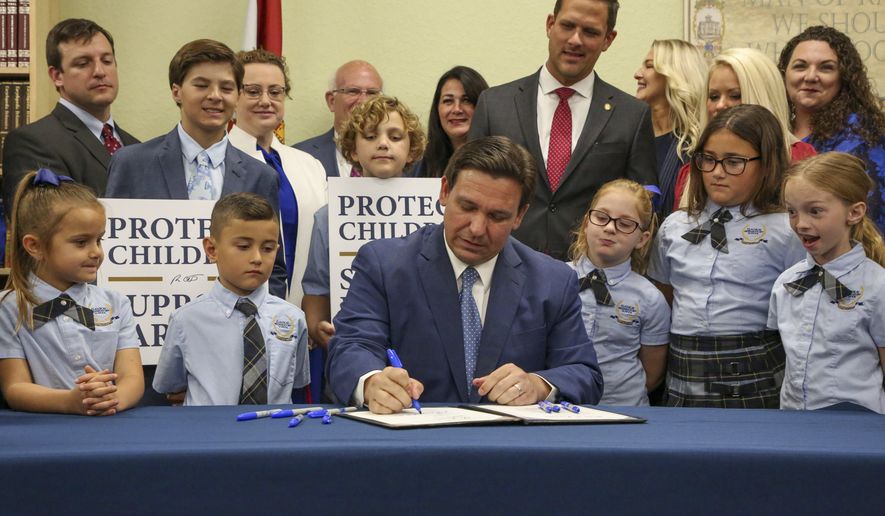Republican state legislatures across the country are following the lead of Florida and its Parental Rights in Education legislation, introducing their own versions of what LGBTQ activists and left-leaning critics have derided as “Don’t Say Gay” laws.
Republican lawmakers have filed similar measures in Georgia, Ohio, Louisiana, Arizona, Indiana, Oklahoma, Kansas and Tennessee. More have pledged to follow.
Ohio’s bill, introduced this month, echoes the Florida law with language that tells schools not to “teach, use or provide any curriculum or instructional materials on sexual orientation or gender identity” for the youngest public school students — those in kindergarten and first, second and third grades.
Joni Madison, interim president of the LGBTQ advocacy group Human Rights Campaign, condemned the Ohio bill.
“What it will do is impose a chilling effect on free speech in classrooms across the Buckeye State and make LGBTQ+ students and people of color feel marginalized at school, a place where they should have the opportunity to learn and grow up feeling respected for who they are,” Ms. Madison said.
Kimberly Fletcher, founder of the Ohio-based parental rights advocacy group Moms for America, said the bill shows that American children “are not a pawn in a political game.”
“They deserve to have their innocence protected from all sexual content. The how and when should be left to the parents, not the public school system,” Ms. Fletcher said in an email.
Georgia’s bill, introduced last month, would forbid “classroom discussion of sexual orientation or gender identity in primary grade levels or in a manner that is not appropriate for the age and developmental stage of the student.”
Tennessee’s bill, revived in February, would ban instructional material that would “promote, normalize, support, or address lesbian, gay, bi-sexual, or transgender issues or lifestyles.”
Andrea Haitz, a member of Mesa County’s District 51 school board in Colorado, said the parental rights bills have become a “movement” that “is not stopping” despite efforts on the left to stigmatize supporters of age-appropriate curricula as bigots.
“Parents are refusing to give up local control of their schools, their tax dollars and, most importantly, control of what enters their child’s mind, heart and soul,” said Ms. Haitz, who was elected in November after running for office as a concerned mother of three.
Ms. Haitz said parents who support the laws do not believe “taxpayer-funded schools” have a right to discuss sensitive topics that they prefer to address with their children at home.
Florida Gov. Ron DeSantis, a Republican, signed H.B. 1557 into law on March 28. The law forbids the state’s K-3 schools from teaching lessons on gender identity.
The Florida law, which does not contain the words gay or transgender, states: “Classroom instruction by school personnel or third parties on sexual orientation or gender identity may not occur in kindergarten through third grade or in a manner that is not age appropriate or developmentally appropriate for students in accordance with state standards.”
Gay rights advocates have fiercely challenged the conservative claim that teaching small children about gender identity allows LGBTQ teachers to “groom” them for potential gender-change transitions.
To protest the law, 500 students walked out of one Florida high school early last month.
Walt Disney Co. heir Charlee Disney, a 30-year-old transgender science teacher who uses the pronouns “they/them,” questioned the Florida law’s impact on students in a recent Los Angeles Times interview: “They can’t learn about their community and their history at school or play sports or use the bathroom they want to use?”
Leslie Owen, a nonbinary Florida public school teacher who wears a rainbow shirt to work, told Pink News on April 4: “I’m not going to change the way I teach at all. And if they want to come after me, then let them do so.”
Jay W. Richards, a senior research fellow at the conservative Heritage Foundation, said the support of bills is a natural response from parents concerned about growing social pressure on children to consider changing their biological sexes with “gender-affirming” medical care.
“Florida lawmakers know what every decent parent knows,” Mr. Richards said. “Teachers shouldn’t be talking to 5-year-olds about their sexual attractions and shouldn’t be teaching kids that their supposed ‘gender identities’ trump their sexed bodies.”
The wave of copycat bills has divided free speech advocates.
Jonathan Zimmerman, a history professor at the University of Pennsylvania, said barring topics from the classroom could stifle free expression.
“My deepest concern is that these bills will make it harder for teachers to address questions around gender sexuality and for students to learn about them,” Mr. Zimmerman said.
Robert Heineman, who teaches at Alfred University in New York, said the bills address a growing social trend toward sexualizing children at younger ages than in past generations.
“What these recent laws do is to remove the doubts and insecurity that the increasing focus on sexual orientation fosters and refocus on an insistence that reading, writing and arithmetic provide the appropriate challenges at this level,” Mr. Heineman said.
Meanwhile, more bills are looming.
Texas Gov. Greg Abbott, a Republican, has promised to make it a “top priority” to enact a law similar to Florida’s in the next legislative session.
Andrew Giuliani, a Republican gubernatorial candidate in New York, said in an interview last week that he would “push legislation” like the Florida law if elected.
Conservatives believe the parental rights bills tap into growing election-year frustration with left-leaning school officials and lawmakers.
“It’s common-sense legislation that recognizes parents reserve the absolute right to decide when and what their children are to be taught about sensitive issues,” said Paul J. Batura, vice president of communications for the Christian conservative group Focus on the Family.
• Sean Salai can be reached at ssalai@washingtontimes.com.




Please read our comment policy before commenting.